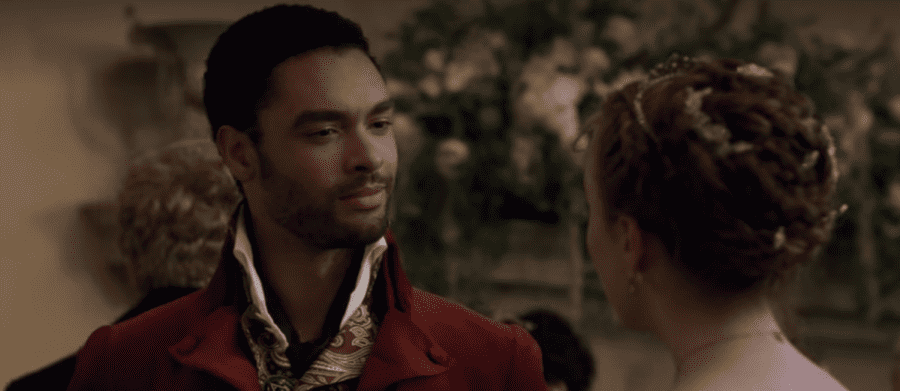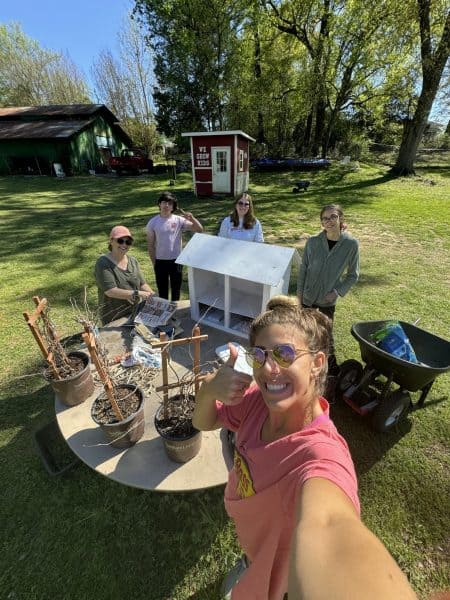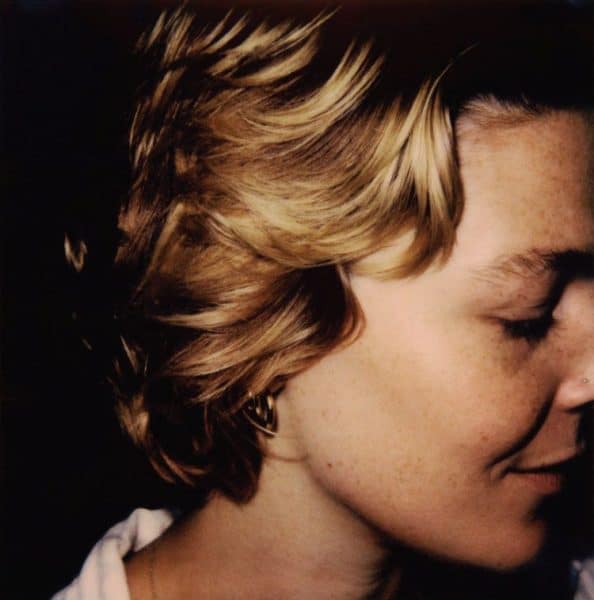Review | ‘Bridgerton’ is the stuff of our empire-waisted dreams
In no small feat, this Shondaland series brings sex and intrigue to 1800s London.

More stories from Tara Davenport | @tara_davenport
The first made-for-Netflix television series from executive producer Shonda Rhimes, the creative genius behind “Grey’s Anatomy” and “Scandal,” is here, and it’s, in a word, steamy.
“Bridgerton” is already the most-watched Netflix original series ever, maybe because it offers escapism and sweeping romance to a mid-pandemic audience desperate for both.
After eight episodes of formal courting, extravagant balls and passionate declarations of love, you’ll wonder how you’ve lived without empire-waisted dresses and Regé-Jean Page’s face. At least, I did.
The year is 1813 in Regency-era London. It’s a time of champagne towers, umbrellas that match your outfits and, apparently, a lot of sex.
I’m talking about sex up against trees, sex on ladders, sex outdoors, sex in brothels, sex at orgies and more.
The scene is set by Lady Whistledown, an anonymous gossip columnist who has just arrived on the social scene and promises to reveal every sordid detail about the men and women of the ton.
Lady Whistledown, voiced by the queen herself, Julie Andrews, is basically an old-fashioned Gossip Girl, but is undeniably better because you get to hear what Andrews saying the word “bitches” sounds like. Admit it, you’ve always wondered.
Our tale follows Daphne, the fourth-eldest of the Bridgertons, a high-society family still grieving the death of its patriarch.
How can you remember she’s the fourth child, you ask? Well, because the siblings were conveniently named in alphabetical order, of course.
With the accompaniment of her mother, Lady Bridgerton, and her eldest brother, Anthony, Daphne makes her debut in London’s annual social season. This sounds lovely, but is basically an open meat market for young women looking for husbands.
But, where are the rest of the Bridgerton siblings?
Second-eldest, Benedict, and third-eldest, Colin, are “rakes” (read: promiscuous men) who pretty much get to prance around and flirt with anything that moves without worrying about marriage, because they’re men, of course.
Eloise, who vocally criticizes the season’s rituals for being archaic and oppressive, has dreams of going to college instead of marrying. She’s happily sitting out this year and spends the season gossiping with her best friend Penelope Featherington and attempting to unmask Lady Whistledown’s identity.
Penelope Featherington and her two sisters are also being served up at the meat market by their conniving mother, but Lady Featherington has more on her plate than she bargained for when her distant niece comes to stay with them and join the season, too.
At the presentation of the young debutantes to Queen Charlotte, Daphne is triumphantly declared “flawless,” but Lady Whistledown reminds us with an ominous music transition that “the brighter a lady shines, the faster she may burn.”
Enter: Simon Bassett, Duke of Hastings. It’s infuriating, yet undeniably historically accurate.
Simon has only returned to London because of his father’s recent death and he has no interest in participating in the social season while he’s in town. Unfortunately for him, as the new Duke of Hastings, he is now the single most eligible bachelor on the market.
Luckily for us, Lady Danbury, who basically raised Simon and looks amazing in purple, ropes him into the scene.
Simon and Daphne decide to pretend to be courting, so that Simon will be left alone and Daphne will receive more attention from other male suitors. Ah, good old-fashioned double standards.
Sure enough, Daphne soon catches the eye of Queen Charlotte’s nephew, Prince Friederich. Of course, it couldn’t possibly be that simple because Simon and Daphne obviously develop real feelings for each other while putting on their charade. Bet you didn’t see that coming.
Meanwhile, poor Lady Featherington finds out her husband has gambled away all their money, and he can only afford to pay the dowry to marry off one of their girls. As if that weren’t enough, Marina Thompson, the distant cousin staying with the Featheringtons, is pregnant! So now, Lady Featherington needs to marry off Marina ASAP: like, soon enough that her future husband won’t realize she’s pregnant with another man’s baby until it’s too late for the poor sucker.
Honestly though, the wildest part of this subplot is when you find out the women of the ton don’t know what sex is or how women get pregnant.
Yes, you heard that right. These teenage women, who are taught their one responsibility is to get married and produce heirs, have been intentionally kept in the dark about sex and pregnancy.
You would think that would be important knowledge for the women to have before making life-altering decisions like whom to marry, but apparently not.
It’s infuriating, yet undeniably historically accurate.
Luckily for the series, and for us, fairy godmother Shonda Rhimes chooses to break with the traditions of historical romances to bring a much-needed modernity to “Bridgerton.”
In an unexpected scene, Simon opens Daphne’s eyes to sexual pleasure when he explains to her how to touch herself. Although watching that conversation did make us writhe in discomfort, the candor is incredibly important.
Unlike other period romances, “Bridgerton” doesn’t shy away from female sexuality or neglect women’s sexual needs. Instead, it unapologetically celebrates female masturbation and pleasure in a way that empowers its female characters, which is nothing less than what they deserve.
Although set in a seemingly boring time where, as my roommate aptly put it, “if you dance with someone three times at a ball you’re engaged,” “Bridgerton” manages to deliver hot and heavy sex, shocking scandals and delightfully subtle humor.
“Bridgerton” works because its female characters aren’t perfect; they’re messy. But that’s what makes them feel real.
I’ve never been a fan of British period series like “Downton Abbey” or “The Crown” before, but if you too want to dip your toe into the water of historical dramas, “Bridgerton” is a good place to start.
It’s already been renewed for a second season, and, personally, I couldn’t be happier for the series that gave us Regé-Jean Page licking a spoon in slow motion and a string arrangement of Billie Eilish’s “Bad Guy” that I never knew I needed.
Shonda Rhimes, the creative genius behind Grey’s Anatomy and Scandal, and her production company, Shondaland, made the move from ABC to Netflix in 2017.
As part of a multi-year development deal, all new Shondaland productions will be released as Netflix Original series.











